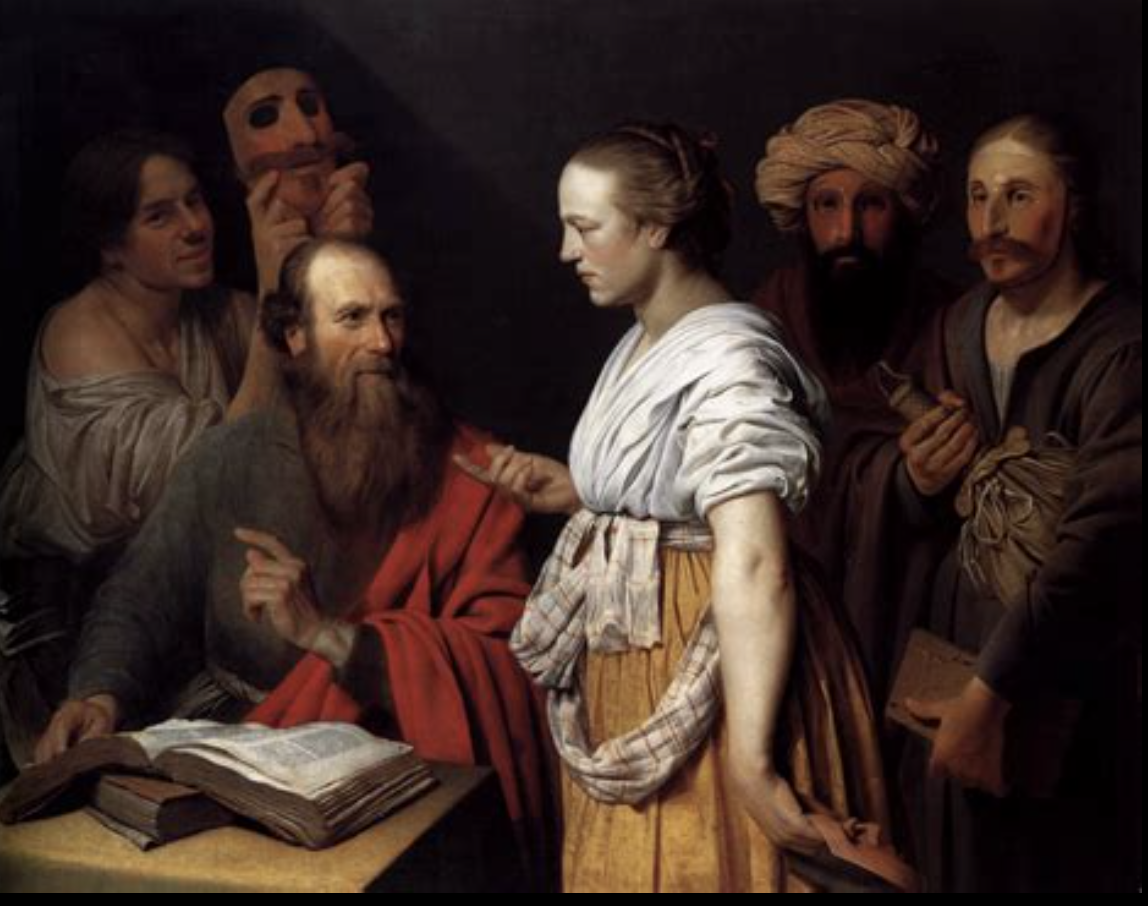

Submitted on August 25, 2015, to Professor Ben Lockerd as part of the doctoral course, LIT 7324 Literary Analysis: Great Ideas, Authors, and Writings.
Studies in classical literature, such as Plato's Republic (Book X), Ion, and Phaedrus, Aristotle's Poetics, Horace's The Art of Poetry, and Plotinus's On Intellectual Beauty, articulate foundational principles later recovered by Renaissance humanists and systematized into the studia humanitatis.[1] Secondary works by modern umanisti such as David Lyle Jeffrey and Gregory Maillet apply the rudimentary principles of humanitatis in “Literature and Truth” (chapter 1) and “Theological Aesthetics and Christian Literary Criticism” (chapter 2).[1][2]
The ideas proposed by Plato (ca. 427–347 B.C.E.), Aristotle (384–322 B.C.E.), Horace (65–8 B.C.E.), Plotinus (204–270 C.E.) and Jeffrey and Maillet (2011) represent epochs in literary history forming a partial corpus from which I, as a modern umanista, gain ideological perspective being transliterated (or not) into a post-modern, secular world.[3]
Classical Foundations → Humanist Reception
427–347 BCE
Plato (Πλάτων)
Republic X; Ion; Phaedrus — Forms (εἶδος, eidos); mimesis (μίμησις, mimesis) vs. truth (ἀλήθεια, aletheia); divine inspiration (θεία μανία, theia mania) vs. knowledge (ἐπιστήμη, epistēmē).
384–322 BCE
Aristotle (Ἀριστοτέλης)
Poetics — universals (καθόλου, katholou) over particulars (καθ᾽ ἕκαστα, kath’ hekaston); probability (εἰκός, eikos) & necessity (ἀνάγκη, anankē); poet as shaping what could occur.
65–8 BCE
Horace
Ars Poetica — wit & irony; decorum; meter (iambus); satiric imagery critiquing mismatched form.
204–270 CE
Plotinus (Πλωτῖνος)
On Intellectual Beauty — beauty in the intelligible (νοητόν, noēton); anagōgē (ἀναγωγή, anagōgē) toward the One (τὸ ἕν, to hen).
2011
Jeffrey & Maillet
Christianity and Literature — modern theological aesthetics; humanist legacy in a postmodern context.
The following visualization situates these thinkers in their historical sequence, highlighting the continuity from classical sources through Renaissance humanism to modern criticism, showing how their ideas were transmitted and reframed across epochs into the studia humanitatis and beyond.
Plato: Forms, Imitation, and Divine Inspiration
Plato teaches that the “one who is the maker of all the works of all other workmen” (the craftsman or δημιουργός) is to be preferred rather than the one who imitates the works of other men.[4] In essence, the imitator is inauthentic while the originator is authentic.
Plato warns against being too narrow in learning and perspective.[5] Ion is an expert on quoting the lines of Homer but does not understand the meaning of the lines in Homer’s work. Even more limiting is his lack of knowledge and disinterest in any other poet. Plato further explains that Ion’s ability is not rooted in knowledge (epistēmē) but in divine inspiration (enthousiasmos), which for Plato underscores the distinction between technical skill and ecstatic possession.
Plato emphasizes[5][6] that those who love wisdom are mindful of the art of writing, discourse, and rhetorical skill.[6] In Platonic thought, wisdom (σοφία) is not embodied in human art or skill, but in the transcendent realm of the Forms, with the Form of the Good as the highest principle.
The one who loves wisdom (φιλοσοφία) has interest in the finer arts of learning.[8] Subsequently, in seeking the finer arts, the lover of wisdom, the philosopher, seeks alignment with truth and the Good rather than mere imitation.[7][8] The philosopher who allows the mind to expand through the reading of poetry engages the finer arts in learning.
Aristotle: Universals, Probability, and Poetic Truth
Aristotle observes that the “poet writes not of particular events but of things as they might occur,” thus privileging universals over particulars.[9] Thus, the poet is not merely an imitator of reality but instead represents universal themes based on probability and necessity.
In essence, the imitator, like “a painter or any maker of likenesses... must imitate things that were in the past, or are now, or that people say and think to be or those things that ought to be.”[11]
Horace: Wit, Decorum, and the Ars Poetica
Horace reminds me of the pithy writings of Erasmus.[12] His style is quick-witted with a proverbial flair. Horace writes with an ironic verve that invites comparison to Erasmus, though in a very different historical and cultural register.
He writes of a human head, a horse, a discolored fish, dolphins in the woods, boars on waves, Neptune at home on the land, a merchant farming the green land, a phlegmatic old man, Medea cooking up human flesh, harbors crowded with ships, or royal disease of jaundice.[13] His mind is sharp with piercing arguments made at each turn of the text.
Meter and Diction: Horace and Aristotle in Dialogue
Horace and Aristotle discuss meter. Horace states, “a short syllable followed by a long is of course an iambus. It moves along fast….”[14] Aristotle comments on diction as “the act, itself, of making metrical compositions, and by melody, what is completely obvious.”[15]
Plato’s works, Ion and Phaedrus, are in the form of conversations between Socrates and the key protagonists with a quicker pace compared to that of Republic.
Plotinus: Beauty, the Intelligible, and Ascent to the One
Plotinus extends this Platonic tradition by locating beauty in the intellectual realm beyond the sensible world, urging the soul to ascend toward the One. Though treated briefly here, his contribution underscores the continuity of the classical search for transcendence.
Classical Voices in the Postmodern World
For an umanista seeking clarity of ideas in a post-modern, secular world, the works of these authors help provide a broader ideological perspective than I had exposure to previously. Rather than relics of a bygone literary order, these authors remain active interlocutors in the intellectual tradition. Their works form a continuous dialogue across epochs, shaping the studia humanitatis and sustaining the pursuit of wisdom.[9][10]
Endnotes
- David H. Richter, The Critical Tradition: Classic Texts and Contemporary Trends, 3rd ed. (Boston: Bedford/St. Martin’s, 2007), 25–49, 55–93, 109–19.
- David Lyle Jeffrey and Gregory Maillet, Christianity and Literature: Philosophical Foundations and Critical Practice (Downers Grove, IL: IVP Academic, 2011), 35–93.
- The listing of dates in this paper is intended to recall the span of history in which these great ideas have not only survived but thrived in the minds of men of letters. The 700-year span from Plato to Plotinus is evidence that their minds produced ideas without the boundary of time. Almost two millennia later, Jeffrey and Maillet continue the distillation of great ideas. While the plausibility structure of a society migrates through time and geography, the great ideas of classical learning remain without the deteriorating influence often observed in the passage of time.
- Richter, The Critical Tradition, 30.
- Richter, The Critical Tradition, 42. Plato wrote, “And whenever anyone chants the work of any other poet, you fall asleep, and haven’t a thing to say…,” and “When anyone mentions Homer, you are ready, but about the other poets you are at a loss” (quoted in Richter).
- Richter, The Critical Tradition, 48–49. Plato’s concern for writing, discourse, and rhetorical discipline anticipates later educational models, though the formal trivium (grammar, logic, rhetoric) was systematized only in the medieval curriculum.
- In Plato, wisdom is not personified as a deity but expressed in the transcendent Forms, with the Good as supreme.
- The term φιλοσοφία is transliterated from Greek to English as “philosophy,” meaning lover of wisdom. Plato wrote, “…lovers of wisdom or philosophers is their modest and befitting title.” He continues, “until a man knows the truth of the several particulars of which he is writing or speaking, and is able to define them as they are… will be unable to handle arguments according to rules of art, as far as their nature allows them to be subjected to art, either for the purposes of teaching or persuading…” (quoted in Richter).
- Richter, The Critical Tradition, 65. Aristotle wrote that the function of the poet is to narrate events as “might occur and have the capability of occurring in accordance with the laws of probability or necessity” (quoted in Richter).
- Aristotle holds a differing view of the poet from his mentor, Plato. Plato assumes the poet is an inauthentic mimesis. Aristotle views the poet as an interpreter of the authentic.
- Richter, The Critical Tradition, 78–79.
- Erasmus of Rotterdam, Praise of Folly; And, Letter to Maarten van Dorp, 1515, trans. Betty Radice (London: Penguin Classics, 1994).
- Richter, The Critical Tradition, 84. Horace wrote, “Suppose you’d been asked to come for a private view / Of a painting wherein the artist had chosen to join / To a human head the neck of a horse, and gone on / To collect some odds and ends of arms and legs / And plaster the surface with feathers of differing / colors…” (quoted in Richter).
- Richter, The Critical Tradition, 84.
- Richter, The Critical Tradition, 62.

